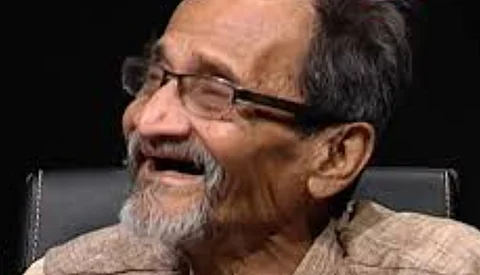

Kolkata | Azizul Haque — firebrand poet, political thinker and one of the last towering leaders of India's Naxalite uprising — died here on Monday, marking the end of a turbulent, blood-soaked chapter in Bengal's radical Left history that once shook the nation in the 1960s and '70s.
He was 83.
Haque, who was born in Howrah in 1942, belonged to the generation of Naxal leaders who believed that 'bonduker nol-i, khomotar utsa' (Political power flows out of the barrel of the gun), a doctrine popularised by their ideological mentor, Charu Mazumdar, who made the Mao Zedong's slogan popular in India in the Sixties and Seventies.
A poet, political thinker and once the head of the CPI(ML)'s second central committee, Haque had long been battling illness and was admitted to ICU after a fall at home that left him with a fractured hand.
He breathed his last at 2:28 PM, sources said.
West Bengal Chief Minister Mamata Banerjee expressed deep condolences on X, describing Haque as a "fighter who never bowed down in his long political life".
"I express my condolences at the passing of veteran politician Azizul Haque. Azizul Haque was a fighter, a resolute leader. In his long political career, he never bowed his head. I extend my heartfelt condolences to his bereaved family and associates," she posted on X.
A close associate of Charu Mazumdar and Kanai Chatterjee, Haque was among the few leaders who kept the flame of the Naxalbari uprising alive long after it was crushed by the state.
He was expelled from the CPI(M) for endorsing Mazumdar's radical line, later co-founding the CPI(ML)'s Second Central Committee with Nishith Bhattacharya after the latter's death.
Under their leadership, the faction tried to set up parallel revolutionary governments in parts of rural Bengal and Bihar during the late 1970s, before being expelled following a ceasefire accord with the West Bengal government.
First arrested in the Parvathipuram conspiracy case in 1970 and was released in 1977.
Haque spent nearly two decades in prison over his lifetime.
His re-arrest in 1982 triggered outrage even within Bengal's ruling Left Front, with jail ministers Debabrata Bandopadhyay and Jatin Chakraborty recommending his parole after visiting him behind bars.
His book 'Karagare Atharo Bochor' (Eighteen Years in Jail) remains one of the most poignant firsthand accounts of Naxalite movement and ideological resilience in that era.
Haque's writings, including 'Naxalbari: Tirish Bochor Aage ebong Pare', continued to challenge establishment thinking even as he gradually moved away from hardline Naxalism in his later years.
Notably, he supported the CPI(M)'s industrialisation drive in Singur in 2006, distancing himself from many of his former comrades who opposed land acquisition.
"Leftism is to walk against the current," he often said, and till the end, his pen remained active-contributing columns and essays to leading dailies and journals, always with a streak of rebellion.
Azizul Haque's death is not just the passing of a political veteran, it is the quiet extinguishing of one of the last flames of Bengal's revolutionary Left.
For many, July 21, 2025, will be remembered as the day a radical conscience bid farewell.
